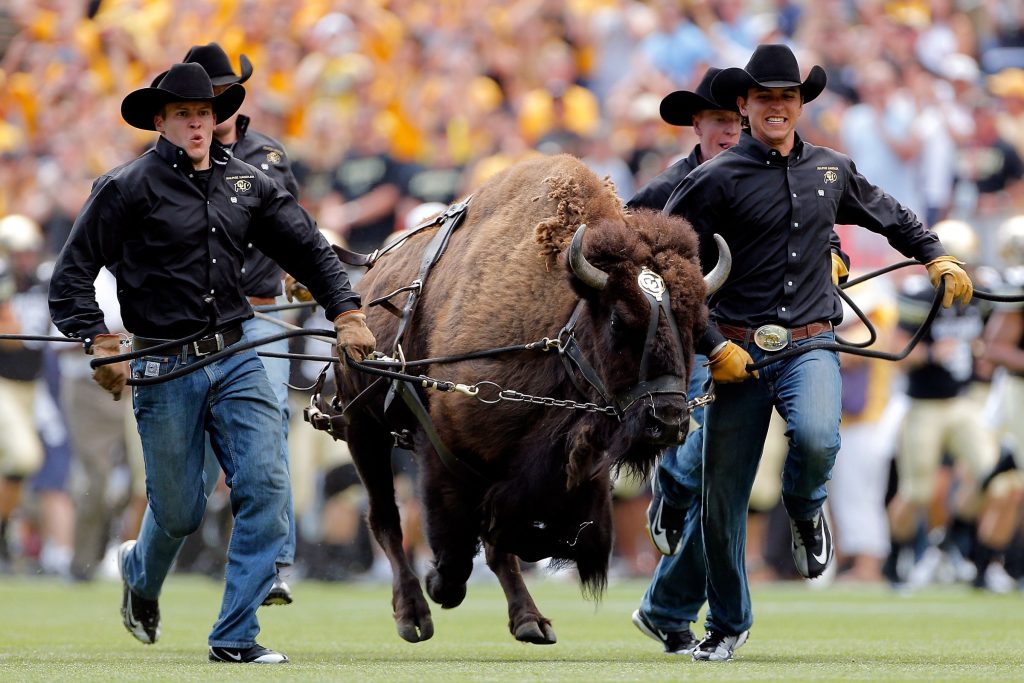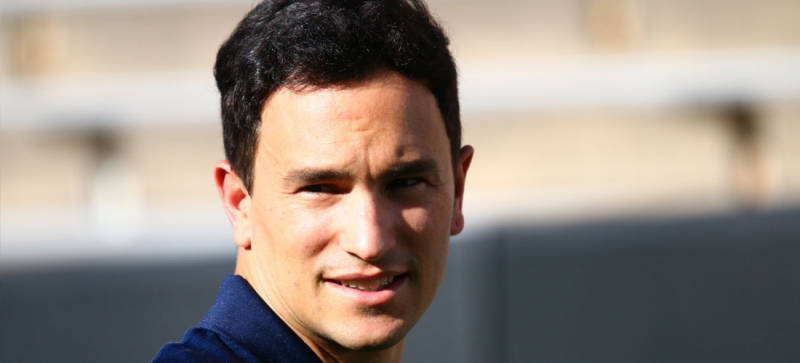Collegiate all-American, Olympian, NFL standout, philanthropist, clean sport advocate, entrepreneur. How a Colorado kid summoned the responsibility to do what’s right.
2002, Denver, Colorado, Pt. I
Not much is expected of third-string punt returners. In fact, in the pantheon of college football legends, few – if any – tales of greatness begin with a freshman, buried on the depth chart, sedentary on a steel bench watching teammates carry the load. Yet in the fall of 2002, this is where Jeremy Bloom found himself. A native of Loveland, Colorado, Bloom was already a prodigy of sorts. A World Champion and Olympian at the age of 19, there was no doubting his athleticism. But at just 5-foot-9, Bloom was undersized by college football standards, and despite his obvious potential, he found himself resigned to the bench in his first-ever collegiate game.
“BLOOM!” ROARED UNIVERSITY of Colorado football coach Gary Barnett.
Wide-eyed, the 19-year-old sprung to his feet, frantically searched for his helmet and ran towards his coach’s voice.
“I want you to go return this punt,” said Barnett.
“No problem, coach,” Bloom responded.
And with that, the 19 year-old buckled his chin strap, took a deep breath and ran out on the field for the first time in his college career.
Long-time Colorado mascot “Ralphie” leads the Buffaloes on to the field against rivals Colorado State (photo: CU Athletics)
IN MANY WAYS, we are all products of our environment. More often than not, it is those closest to us who hold the greatest amount of influence – our role models and heroes. Jeremy Bloom’s role model was his grandfather. He was his hero, too.
1930, Philadelphia, Pennsylvania
A child of the Great Depression, Jerry Bloom worked three jobs to help his mother pay the bills. They had been abandoned by Jerry’s father and left to fend for themselves during the darkest days of an economic tragedy. Hoovervilles, shanty towns made up of cardboard and spare wood, had sprung up around the country. Soup kitchen lines wrapped around the block and the annual median family income fell to just $1,500. Out of bed every day by 3 a.m. to deliver milk, Jerry would then walk six blocks to a local bakery and work until twilight, before heading off to a busy intersection where he would sell newspapers for as long as he could stay awake. He was 11 years old.
TOUGH AS NAILS, the Bloom family made it through the Depression and Jerry would go on to serve with distinction as a gunner in World War Two, flying missions over Nazi-controlled France and Germany – racking up a handful of medals in the process. He was an impressive man, honest and hard-working, but It wasn’t until his later years that he would find one of his life’s most fulfilling pastimes: skiing with his young grandson, Jeremy.
On family trips to Keystone, Jeremy’s mom and dad – both excellent skiers themselves – would head off to the summit leaving their son to ski with his grandpa. At the top of the first lift, Jerry would carefully pin a superman cape to the back of his Grandson’s jacket, and Jeremy – who came from a home in which few sweets were allowed – would then watch as his grandfather laughed and hurled miniature candy bars down the mountain, telling his grandson that he could only keep them if he could manage to ski past and pick them up without stopping. Infinitely motivated by the prospect of sugar and chocolate, Jeremy would then fly down the mountain, cape billowing, spectacularly grabbing candy bars as he cut through the snow.
1999, Tokyo, Japan
By the age of 15, Jeremy Bloom was the youngest ever member of the U.S. Ski Team. His rise to prominence provided him with the unique opportunity to see new parts of the world, and experience new cultures. In his first ever trip outside the United States, Bloom traveled with his ski team to Tokyo, Japan.
SITTING ON A crowded public bus, surrounded by Tokyo’s high rise buildings, well-lighted advertisements and flashing LED boards, Bloom watched as his transportation rolled to a stop and an elderly woman began to make her way on board. Nearly everyone on the bus stood up, and Jeremy observed how strangers helped the woman with her bags, guided her to her seat, and collectively bowed in respect as she sat down.
Watching this cultural phenomena unfold, Jeremy thought of his grandfather pinning the superman cape on his back. He thought of his grandmother who had lived with him his whole life. And he thought about how he wished his own culture held senior citizens in the same esteem.
Sitting on that bus in Tokyo he quietly vowed to himself that if he ever had a platform to build a bridge, one that could help usher this same ethos of respect and gratitude to the United States, he would do it.
2002, Denver, Colorado, Pt. II
AFTER RUNNING ONTO the field, Bloom – a mere afterthought only moments before – took center stage. Setting up shop on his own 20-yard-line, he stood alone, looked around and began to assess the gravity of the situation he now found himself in.
“I remember jogging out on to the field and being kind of overwhelmed by it all,” recalls Bloom. “It was the third quarter of the season opener versus Colorado State. At the time we were the No. 7 ranked team in the country and you could just feel the energy. 75,000 plus people, all packed tightly in to Mile High Stadium – it was a big moment. To top it off, it was my very first game; my very first time on the field.” Elite-level athletes often talk about acoustics. It helps them describe the difference between playing in a game and watching one at home. For the average armchair quarterback, the soundtrack to sport is intro music and a voice of gravitas who narrates the proceedings from start to finish, often waxing poetically about the thrill of victory and the agony of defeat. On the field, however, it is a much more organic, individualized experience. The murmur of the crowd, the intermittent sounds of whistles and coaches shouting instructions. It’s the pop of pads colliding, the public address announcer calling out the down and distance, and the endless exchange of smack-talk.
“I remember having to calm myself down,” says Bloom. “If I was going to have any success, I needed to settle my nerves. It was obviously loud, but I remember thinking the sounds were all familiar. The same noises I heard during every other game I had ever played. There was comfort in that. Even though I knew it wasn’t, I told myself it was just another game of backyard football. To combat the nerves, I had this technique where I would try to envision a fast-flowing river running through my mind – a river that could carry away all the unneeded noise and any feelings of negativity or self-doubt.”
The public address announcer called out Bloom’s name. The ball was snapped, pads collided, and the crowd roared. The Colorado State punter caught the snap, took two steps and hit it flush. As Bloom positioned himself under the soaring punt, all-to-aware of the opposing coverage unit bearing down on him, there was still one thought that he couldn’t seem to shake. The river just wouldn’t carry it away.
“Please don’t drop the ball.”
EVEN WHEN COMPETING on the highest level, a certain fear always existed in the back of Bloom’s mind.
What is my life going to look like after athletics?
It is both an inherent and a perpetual fear, present in most all athletes, many of whom struggle initially to find purpose once their playing days are over. Their sense of identity is sometimes too entangled in their athletic pursuits to clearly envision life after sport. Bloom was all too conscious of this, and it sometimes kept him up at night.
“I always felt a great responsibility to create a fulfilling life for myself after my career in pro sports was over,” he said. “It was something I thought about constantly – it frightened me, and I think in some ways it motivated me. The truth is, the money you make as a professional athlete doesn’t give you purpose. It can make your life easier, but it doesn’t give you purpose – it doesn’t define who you are. I knew I needed to do something with my life that I would be proud of, something my parents and grandparents could be proud of too.”
So following his retirement from professional sports, Bloom began to take classes at the University of Pennsylvania’s Wharton School of Business. He had found his platform, and with his grandparents and the experience in Tokyo still top of mind, Bloom founded a non-profit organization called Wish of a Lifetime.
The concept was simple: the organization would help grant life-long wishes to our oldest generation. There was Nancy Tarpen, who wanted to visit her daughter, Lucille, who was suffering from cancer. Nancy didn’t have the income to make the trip, so Jeremy and Wish of a Lifetime flew with Nancy to Claypool, Arizona so she could spend a few days with her ailing daughter. There was Shirley, a blind woman who loved Jeopardy and would follow along in brail from her home in Florida. Her lifelong dream was to meet Alex Trebek, so Jeremy and Wish of Lifetime flew Shirley to Los Angeles where she walked on set and got a hug from the voice she had listened to for so long. There was Bill Tiller who just wanted a rug. Not a fancy rug, just a plain rug. He was 86-years-old, suffering from Diabetes and when he would get out of bed in the morning his feet would sting as they contacted his cold, linoleum floor. Bill beamed as Jeremy and Wish of a Lifetime laid down his new rug. But it wasn’t just the carpeting that brought out Bill’s contagious grin. It was something more. It was the same reason Nancy and Shirley smiled… It was knowing that now, in the sunset of their lives, people still cared.
Jeremy created Wish of a Lifetime for his grandparents. He created it for the little kid picking up candy in the snow and for the woman in Japan. He created it because he had found his platform and because it brought fulfillment to his life. He created it because it was the right thing to do.
2002, Denver, Colorado Pt. III
THERE ARE FEW things in the world of sport more exposing than returning a punt. You’re on an island. Eleven players, locked in, running full speed at you while you’re staring skyward, tracking down an 11-inch sphere of cowhide falling from the clouds. It takes a different breed of athlete to volunteer for this duty. You have to want the spotlight; you have to want the ball in your hands. It’s fight or flight… and only the strong survive.
Jeremy Bloom was one of those athletes, a volunteer, a fighter, and as he plucked the ball out of the mile high air he was acting on instinct. Under bright lights, with room to run, Bloom sprinted forward, darted right – effortlessly switching the ball from his left hand to his right. Textbook. Flying up the field, the crowd noise rose to a deafening crescendo as two Colorado blockers flattened a would-be-tackler. Coaches and players alike hauled up the sideline, trying to keep pace, gesticulating wildly as if to help Bloom navigate the chaos. With one player to beat, he cut inside, broke free, spread out his arms in exultation and casually made his way in to the end zone. It was pure bliss. Covering 75-yards in 10 seconds, Jeremy Bloom had ascended from third-string obscurity to a bona fide college football hero.
Today
Nowadays, Bloom spends most of his time in San Francisco. He still helps guide Wish of a Lifetime but has given up day-to-day control in order to run a new business. In doing so, he has raised over $40 million in venture capital, and the organization – known as Integrate – was named as the “Best New Company” at the American Business Awards in New York City. For his efforts, Bloom has been tabbed as one of the 30 most influential people in technology by Forbes Magazine.
SITTING IN HIS bay area office, Bloom thinks about the era in which he came of age athletically; one where steroid use ran rampant. USADA had only just begun operations when he competed in his first Olympics, and the World Anti-Doping Code was still two years away from full implementation. It was a different time. Yet, despite this, Bloom never wavered in his commitment to clean sport. He says he felt compelled to compete clean. Out of responsibility to himself, his legacy, his sport and his family. It is a cause he now gladly champions.
“The global fight to keep sports clean is really challenging,” he says. “We need to continue to do everything in our power to ensure the purity of sport.”
Now 33 years-old, Bloom also reflects on what has led him here. He thinks about the two Olympics, his three years in the National Football League and his stellar collegiate career in Boulder. He still smiles whenever he sees video of the punt return against Colorado State on television.
He also thinks about his family and his grandfather who passed away this last year. He thinks about Wish of a Lifetime and all the amazing people he’s met while making dreams come true. He thinks about what he has learned.
“I think at the core of everything I’ve done lies this idea of responsibility,” Bloom says. “Colorado, the NFL, the Olympics, Wish of a Lifetime, Integrate, the fight for clean sport… it’s all born out of a sense of responsibility. A responsibility to the people around me, my teammates, my co-workers, my parents, my grandparents, and most importantly a responsibility to myself. A responsibility to be the person I want to be. A responsibility to do what’s right.”





